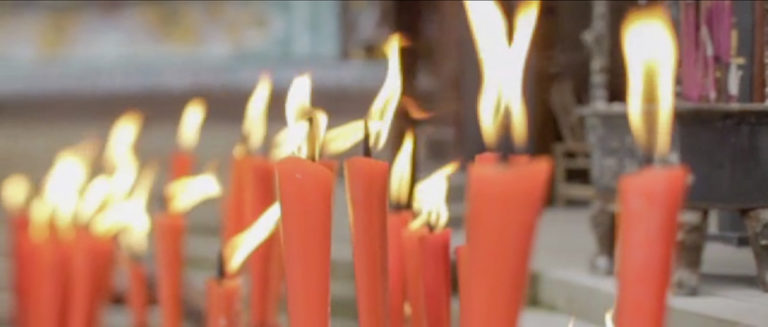There once was an Imam who spread the word of God by walking from place to place and singing scripture to anyone whom he might meet.
By the time he sang his first song away from home, he was already of the age when most men marry. He had grown tall, with broad shoulders that gave a suggestion of great bulk underneath his vest and robes. His head was large and he had a full face, brown and bearded with a hint of red. Except for his eyes, he resembled a farmer from his native region: strong and solid as a bull. Yet within his eyes lay the gift. They were bright, of a hazel color, and were those of a younger, thinner man, a reader and smoker of hashish.
In the gleam of his eyes there was hidden a fever that in other men might have inspired fear or hatred, but it was not so with the Imam. When people looked into his eyes they saw the light that glowed within: a reflection of the Sun of suns that gave all other light meaning and purpose. When he walked through the village, women and children, old men and young men, all followed him and said to each other, This is a man of God.
His voice was a blessing discovered on the steps of his grandfather’s house one evening when he was seven years old. Both his father and grandfather made music and they would go to the steps after dinner and sing to each other lines of poetry they had read in the Holy Book, or had heard from someone else, or that came to them in their dreams. Sometimes they improvised and told stories from their lives or the lives of others, and sometimes they would put the events of the day into song and sing them aloud for the whole family to clap along with.
The young boy displayed a unique ability to hold a note for an extraordinary amount of time, far longer than anyone living within a month’s walk, which is a special characteristic of those who sing best the Word of God. He also displayed his genius in another way, by playing notes on the drum and the guitar that had rarely if ever been heard before, new and fresh and free, yet bound to the poetry as tightly as the most common standard. He tuned his instruments to the river and the wind, to the rustling leaves, the sun and the hum of life around him. Later in life, he would meet many men and women who wanted to know the secrets of making such music, and he would teach them, but to the boy who became the Imam, the secrets had come naturally, merely through playing.
One afternoon, his grandfather played a song praising the wisdom and patience of God. His father had followed with a soaring ode to the power and glory of God. When the boy began to play, the whole family felt the indescribable beauty of God. All looked to the simple things around them and each understood the words and music and felt closer to God than ever before. On that day, the Imam, still just a boy, sang the following lines:
“Find God in the laughter behind the trees
Find God in the flash of water on the stones
Find God in the mist rising up from the earth
In the playground of light
In the solace of shadow
In the moments between moments
Find God.”
His father and grandfather took great pride in the boy and would often sit in the kitchen smoking pipes, discussing how best to teach him without limiting his brilliance. Over the years, family and friends grew accustomed to the young singer whom they knew would one day leave them and walk much farther than any of them had ever walked before, singing his sweet song to Believers the world over.
In time, the boy became a man. It was hard for his family to let him go and hard for him to leave. But In his heart, the young man knew his destiny: to walk the earth and sing. When his mother came to him one evening and set a pack before him, filled with the things a man needs when on the road, he smiled at her and embraced her. His mother did not play music. She inspired it, demanded it softly, ordained it. She gripped him in her arms and he felt that there was nothing softer or more powerful anywhere in the world. She whispered encouragement into his ear and kissed him. He left the next morning. Both he and his parents prayed that the wandering would end in time for them to reunite one last time on this earth.
He sang because it was his calling and he was one of the few destined to fulfill a calling in a way pleasing to God and all Creation, and it was this that distinguished him as a man of God. The people called him the Imam who Sang, although he had never stepped foot in any temple and called no religion his own. He loved God not as a Lord to be worshiped daily, but as a being of beauty to be cherished like the first smile of a baby in the soft light of the morning. When he sang, fathers held their loved ones close and mothers leaned into embraces. It was known his songs could make entire villages sway like golden wheat in a late summer wind.
He arrived at the household of Abu Samra Tarjeman in the height of one such summer, just after dinner, when the whole world was drowsy and drifting into the night. The sky held every shade of blue, from the turquoise of an island shoal to the dark shade blessed with the last glimpse of the leaving sun.
The Imam walked passed the front door toward an apple tree laden with fruit, its drooping branches forming a rustling cave for him to sit in. He crossed his legs, pulled out his short guitar and sang these lines:
“Find God in the embrace that lingers
Find God in the glow of the hearth
Find God in the perfume of a meal
In the warm fields of your hair
In the soft circle of mother and child
Find God.”
Abu Samra loved God and his family very much. He was an honest man, more than 50 years old, and he spent most evenings playing with his six grandchildren, four of whom lived with him along with his two sons, their wives, his younger sister and his sister’s best friend. His wife had died many years before, during the birth of his daughter who had moved into the house of her husband just a short walk away. When Abu Samra heard the Imam sing, he saw his wife’s face again, smiling at him through the window in his soul, and he broke into tears.
His family crowded in around him and they held each other close as the Imam sang verse after verse. If it was at all possible for Abu Samra’s family to grow even closer than they were already, they did that night.
The Imam, as so often was the case in his travels, became for that night both the absolute focus of the beauty of God and a player in the drama of the Tarjeman family, in which God played the central role. He slept in a room off of the kitchen and left early in the morning. The family rose with the sun and they watched the Imam heft his bag and continue on his journey. They called out prayers to him and gave him bread and cheese and a clay pot filled with apple juice.
The sky held every shade of blue, from the turquoise of an island shoal to the dark shade blessed with the last glimpse of the leaving sun.
Come winter, the Imam climbed the mountains and sang for the people of the cliffs, who lived at such heights that the valley dwellers often mistook their fires for stars. They rarely came down from their homes to the river below. When the Imam arrived at the simple stone cottage of Arjan in the dead of night, he found a group of men sitting around a fire, speaking in low, familiar tones on the topic of ice and snow. He ducked his head and slipped in, barely noticed, and sat down beside Arjan and his brother and took out a small drum. With his fingers, he tapped out the rhythm of the blaze and with his palm he echoed the blizzard brewing around the peak. The men fell silent and listened as the Imam sang these lines:
“Find God in the renewing snows
Find God in the winter wind that fuels
Find God in the enduring stones
In the flames like cities in the night
In the stars close enough to touch
Find God.”
With his voice hovering on the last note, Arjan answered him with these lines:
“Blessed is he who brings fruit to his brothers
Blessed is he whose flowers never wilt
Blessed is he who comes
with stories and tales, rhythms and beats
with smiles likes logs on the fire
Blessed is he who sings in the dead of the night.“
The Imam stayed with Arjan and his brothers a few days while the blizzard piled snow up to the roof. They sang together often and it was the special skill of the Imam to remove himself from the altar and allow the beauty of life to take center stage. When he returned to the valleys, no one followed him down and when he walked the paths of the river, no crowds waited for his blessings. He was like the turning of the leaves, something altogether natural, beautiful, significant, and expected.
Word had reached the Prince of a man whom the people loved very much and one day when the Imam was walking along a narrow dirt path through drying fields of tall grass, he came upon three men, armed and mounted, who asked him his name. He told them and they offered him a fourth horse, but the Imam, who had never ridden a horse before, told them he would prefer to walk.
“It is a long way to the Prince’s palace, Imam. You can mount and we can ride slowly and you can sing for us as we go.”
This sounded pleasant to the Imam, so he clambered up onto the fourth horse, shifted several times before he had his rump, legs, shirt, and pants disentangled from each other and the saddle, and then they set off. The Imam tapped lightly on the saddle as he sang lines that put the soldiers in a trance. Perhaps it was the soothing tapestry woven by the words and the hooves and the cicadas in the trees, perhaps it was the meaning of the words themselves, but the four of them slowly lost track of time and the road.
At one point, they rode through a shallow valley with its bottom completely covered in fog. The round hills rolled up, one higher than the other, topped by the yellow grass of late summer. Solitary clusters of pines stood asleep in the shadows like cloaked sentinels, placed there by faeries and djinns, the oldest children of God. The moon was a silver haze in the sky and the company stopped and stared up at the stars.
As the sky swirled on a single point, each soldier thought of home. Had they not thought of home, they might have slipped into that whirlpool of time, thought and space, fully surrendering themselves to what, deep down in their souls, they knew to be the truth. But for the soldiers the ties to wives, sons, hearths, and old friends was strong, and any urge to let go of any of this was terrifying.
The Imam felt the pull as well. For him, the pull was in all directions, toward all men and all women. If the Imam were to surrender now, his body and soul would be scattered among the many tribes of the earth, sprouting here and there as short-lived blossoms or massive oaks. Terror did not grip the Imam as the truth looked down at him. Instead he felt a wistful sadness.
A horse snorted and the swirling stopped. The men shook their reins and continued for a bit further, until they reached a larger cluster of pines under which a bed of drying needles had formed. They laid out their blankets and put their hands underneath their heads, each thinking of what he had just given up and what he had gained in return, until sleep overtook them and their thoughts turned into dreams.
If the Imam were to surrender now, his body and soul would be scattered among the many tribes of the earth, sprouting here and there as short-lived blossoms or massive oaks.
In the morning they rode in single file with the single purpose of reaching the prince’s palace by nightfall. At each hamlet, the Imam felt his heart lean out of his body toward certain ones he saw: a woman and child, with baskets in hand; a bareheaded man resting on an axe; two old men watching the riders from a porch, pipe smoke hiding their faces. His longing grew as the road became wider and the houses and people more numerous.
Soon they were dodging wagons and calling out their stations to unwary idlers taking up space in the now muddy, now hard-packed road to the palace. The Imam kept a running list of faces in his head and promised himself that he would come back and sing for them. But as the hours slipped away and the crowds grew larger, he realized that he would either sing now or never sing for them at all.
All the faces of the realm leapt out at him from the crowds and it was as if God himself were calling each face to turn just so, in order to have those eyes catch his as he trotted past. The Imam knew that it was indeed so, that every face lifted was a face whose chin felt the fingers of God and every eye squinting had the palm of God above, shading out the sun’s rays. Knowing this, the Imam’s heart filled to bursting and he began to sing a wordless song of praise and love that made the self-conscious tingle and burn within, and infected the righteous with the power of a love that refused to go unexpressed.
The Imam, his soldier escorts, the song, and the rush of emotion he evoked in the people who had heard him sing – all of this crashed against the walls of the prince’s city like waves upon a beach. The Imam surged forward on his horse and he heard the sound of hooves galloping on stone and his voice rose to join that sound. One by one the hearts of the people fell behind, followed by the soldiers, who pulled up at the sight of their Prince, a solitary figure standing by the inner gate, hair whipped by the wind, robes open as if he had just leapt up from bed. The Imam approached the Prince, as the last bit of foam and seawater approaches its zenith and must choose between returning to the ocean or sinking into the beach. He dismounted and the prince flowed toward him, a man of beauty with arms outstretched. As they touched hands in the plaza before the castle, the Prince said,
“Stay with me.”
For many days the Prince and the Imam walked in the gardens and sometimes the Prince would speak of his realm and his people and sometimes they would just sit by a fountain holding hands. The Imam sang his wordless song in a low voice while the Prince held flowers in his lap and let his soul course upon the winds that shook the trees of his garden. Often the Imam imagined that he was a wild animal separated from his kind and he would call to them, those who waited just beyond the walls. His voice carried very far and it was not long before servants and gardeners and soldiers would leave their posts and duties and creep ever closer to the gardens that were off limits to all but the Prince, just to hear a few sounds drop from the mysterious man’s lips.
The Prince would gaze at the gathering groups, just outside of the gardens. His eyes were somewhere far away in a place only he and God knew well, but he would smile as the people gathered and they took this as a sign. The ceremonial guards at the gates to the garden one day placed their helmets and spears down and led their wives onto the grass and had a picnic. The women blushed with emotion and happiness and the men smiled widely and leaned back, watching the Prince with love and laughter in their eyes.
When the Prince saw this he threw back his head and laughed and his beauty was the visual counter beat to the Imam’s song, which had become a gay tune, causing those who heard him to clap their hands and bounce on their heels. As the sun began its slow descent into the hills, it watched in glad envy as the beings below walked in pairs and threes and skipping fives to the gardens to watch their Prince dance.
“He has taken off his robes!”
“Look at his hair … “
The Prince was a sight to see for all that day who had the great fortune to behold him. His jet black hair shone purple in the setting sun and his white inner robes of silk and gold flashed as he danced with an abandon that demanded all others join him. And they did, easily and with a laughter that shed yesterday and veiled tomorrow. The whole world was within the garden as the Prince and his people danced and the Imam sang with all his might.
The high priests had long forgotten how to dance and they watched in horror and dismay as the monks of their order rushed headlong into the garden, tossing off their caps and cloaks and shoes and spinning away into the crowds of dancing, laughing, sweating people. The great merchants were powerless to stop their clerks and accountants who fled the shops in droves, tearing away their insignias as they went and all they could do was knock on the doors of empty houses, vainly calling in debts and obligations. The powerful lords and ladies awoke in the morning to learn that the farmers who tilled their lands and the servants who prepared their food and warriors who guarded them as they slept had all stolen away in the night.
As the dawn broke onto the earth, even these last holdouts released their grip on the world around them. As they did, each felt a great weight fall from their hearts and one by one, the priests, merchants and lords rushed down to join the people gathered around the Prince Who Danced and his friend, the Imam Who Sang.






